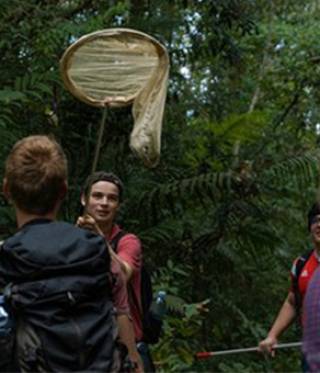Research Title
Structure and function of insect communities in Congolese peat swamp forest
- More about Charlie
Education
- BA (Hons) Biological Sciences, St. Hilda’s College, University of Oxford (2019)
Relevant Experience
- 2018-2021: Invertebrate survey contractor and citizen science facilitator, Wytham Woods, University of Oxford
- 2020: Research intern, Smithsonian Tropical Research Institute, Panamá
- 2019: Research assistant, Jeschke group, Institut für Biologie, Freie Universität Berlin
- Publications
- Lamarre, G. P., Pardikes, N. A., Segar, S., Hackforth, C. N., Laguerre, M., Vincent, B., ... & Basset, Y. (2022). More winners than losers over 12 years of monitoring tiger moths (Erebidae: Arctiinae) on Barro Colorado Island, Panama. Biology Letters, 18(4), 20210519.
- Research Interests
Insects are by far the largest and most diverse group of multicellular organisms on Earth, but worldwide trends point towards sharp declines in abundance and diversity in many groups and systems. However, with the majority of tropical insect richness undescribed and little data on the ecologies of most known species, alternative approaches to those based on species identity must be employed to understand the potential consequences of insect loss.
Functional trait-based approaches, which aim to characterise species interactions with the biotic and abiotic environment via the traits they exhibit, have shown the potential to bypass data impediments and provide generalisation on processes governing community assembly and alteration at a global scale. Network studies, such as those used to document plant-pollinator interactions, have illuminated global patterns of community structure and stability and identified interactions which provide significant ecosystem services to society, such as nocturnal pollination.
These analytical approaches together provide a link between environmental change and functional consequences outside of taxonomic resolution and species-level natural history requirements, which will be utilised to understand the as-yet uncharacterised insect communities of the Congolese peat-swamp forests.
For bees, Lepidoptera and Odonata, trait-based approaches will be used to understand shifts in community structure across forest types and environmental filters in place. The relative importance of diurnal and nocturnal pollinators will be explored with bipartite networks, and a comparison of these communities with those of terra firme rainforest will provide insight into a network structure, ecosystem functioning, and consequences of species loss.
This work will provide crucial insight into ecosystem functioning dynamics in tropical forests, the importance of non-traditional pollinators for ecosystem functioning, and how environmental transitions may impact ecosystem services in a changing natural world.
 Close
Close


